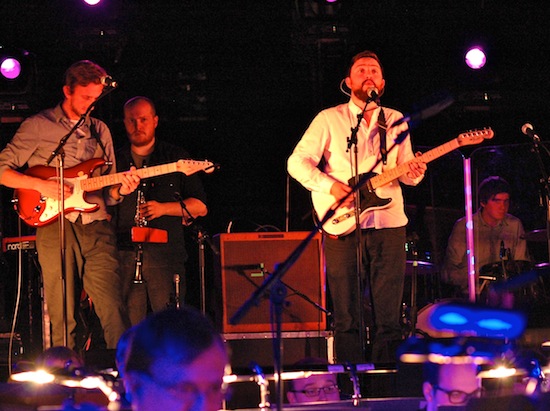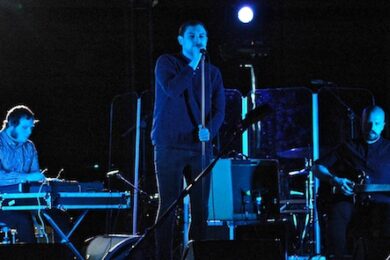Human societies move with inexorable speed. It’s a continuous, steady evolution evident through marked turning points and hindsight. But while we change and age with certainty, our historical buildings are steadfast, resolute relics and reminders of a world vastly removed from our own. The 850-year-old Paisley Abbey has seen so much – not immune to upheaval and transformation itself – and has stood as a symbol of hope and reassurance through kings and wars and progress. It has long been known for its relationship with music, choirs filling its spaces with song for hundreds of years.
Scotland has a fine tradition of creative output, and tonight two worlds come together – a marriage of classical and pop, past and present. It’s a perfectly played collation of our top brass for one of the flagship events of the Spree Festival, this year running alongside the Royal National Mòd, the country’s celebration of Gaelic language and culture.
The mid-autumn air is crisp with an endless night sky and a luminous moon – natural phenomena that are as pedestrian as they are beguiling, everyday elements eternally linked to art, poetry and music, now as ever. They pile in from the queue that has snaked around the outline of the Abbey. Rows of pews are fervently filled – those down the front nose to nose with the Royal Scottish National Orchestra, those further back able to survey the full spectacle of the scene. The RSNO take their seats, conductor John Logan prepares, and The Twilight Sad emerge from the shadows.
Violins flow through the sorrow of ‘The Wrong Car’, which drips with anxiety, guilt and loneliness. Singer James Graham is clearly nervous, but as the chorus kicks in his vocals take off, the orchestral arrangements giving the song the elevation it deserves.
The seedy surge and tragedy of ‘I Became A Prostitute’ is note perfect; ‘Mapped By What Surrounded Them’ follows, rich with gothic imagery through its cries of “She’s cut herself with stained glass window and she’s playing with her toys”, Graham’s voice soaring through every inch of the Abbey’s ancient ornate arcades.
He’s in full flight through ‘Alphabet’, its sinister synth hooks and insistent beats driving half-spat lyrics: “So sick to death of the sight of you now/Safe to say I never wanted you more”, before the percussive lifeline that powers ‘The Room’, from 2009’s Forget The Night Ahead.
Graham is superb through ‘That Summer, At Home I Had Become The Invisible Boy’, wailing like a man possessed (after apologising to Him Upstairs for the language that was to follow) and juddering in his trademark manner, fine features an intermittent blur in the dim blue light.
The Twilight Sad round off an incredible set with a knockout double blow from their debut LP, Fourteen Autumns & Fifteen Winters. ‘And She Would Darken The Memory’ is followed by closer ‘Cold Days From The Birdhouse’, and as the final piano plinks resonate, Graham is visibly relieved/pleased/overwhelmed, the magnitude of the performance finally soaking in. They absolutely smashed it, and the congregation is on their feet – awed by the arrangements and the assembled throng’s sublime musicianship.
It is fitting that our patriarch tonight should be Louis Abbott, the Admiral Fallow frontman so aptly named for this occasion. He and Graham lead the burgeoning army of young and handsome Scots troubadours where beards are optional (preferred) but literate, lyrical poetry and unmistakable melodies are a must.

The five-piece opens with the bounding pop of ‘Guest Of The Government’, before the elegance of ‘Subbuteo’ makes full use of each instrumental embellishment – flute flurries float through the narrative, the song gradually building to an immense drum and clarinet crescendo.
‘Bomb Through The Town’ is the diazepam anecdote to the preceding fury, with flawlessly amalgamated vocal harmonies from Abbott and Sarah Hayes, and violins and double bass hinting at unease.
Wind instruments ring in the start of ‘Dead Against Smoking’ with its gorgeous lyrics (“You smoke when you’re hurt or bored or out with friends, but I don’t mind/And who cares if the Big C comes, we’re young, we’re having some lovely times”) before the rousing refrain of folk rock anthem ‘Isn’t This World Enough??’
The piano accordion laced ‘Oh, Oscar’ slows the pace once more, then the band steps forward to perform an incredible, skin-tingling a capella version of ‘Four Bulbs’ before the enchanting set-closer, ‘Burn’.
Existence would be dishwater without stories and songs, and this crop is carrying on what their foreparents started, keeping us afloat with tales and tunes. If loss is life’s cruelest lesson, then music is its kindest comfort. The flock stands and cheers in admiration and appreciation for the musicians’ craft and this very special ecclesiastical experience. Tonight’s fortunate 400 or so worshippers need no scripted religion, for they have found their solace in song and signature, welcoming their ministers with due reverence, fond hearts and open arms.



